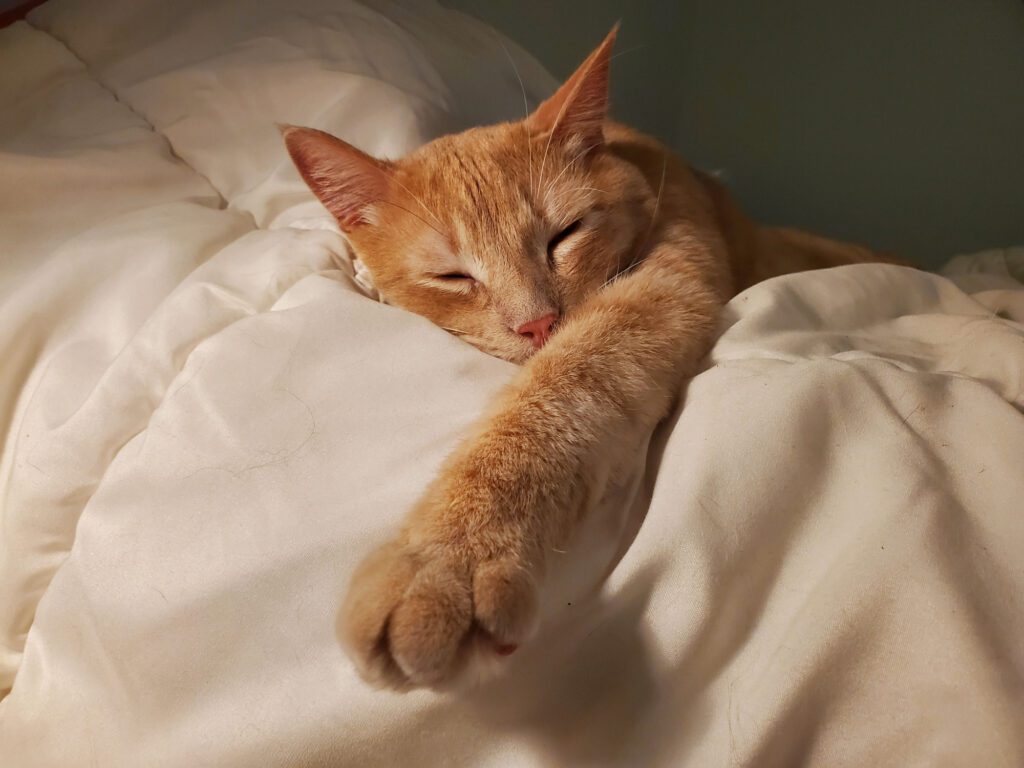My Cat Keeps Snoring – Should I Call the Vet?
We know you love your feline friends as much as we do. That’s why when something’s off, you’re the first to notice. Snoring, for instance, can seem cute at first but can sometimes make you wonder, “Should I call the vet?” Today, we’re exploring the world of cat snores. Sit tight and let’s explore what it means and what steps you should consider taking next.

What Causes Cats to Snore?
You might think snoring is only a human problem, but our four-legged companions can saw logs too! Snoring happens when the airway gets partially blocked, creating vibrations that make that unmistakable sound. There are many reasons why your cat might be snoring, ranging from a simple deep sleep position to potential health concerns.
Sleep Position
Sometimes a snore is just a snore. Cats are experts at finding strange and seemingly uncomfortable positions to sleep in. These positions can cause your cat to snore occasionally, and that’s usually no reason to worry.
Obesity
Just like in humans, obesity can cause snoring in cats. Extra tissue around the throat and neck can block airways, causing your cat to snore. If you’ve noticed your cat putting on a few extra pounds, it might be time to consult the vet for a diet plan.
Breed-Specific Factors
Brachycephalic breeds, like Persians, are more prone to snoring because of their flat faces and shorter air passages. Knowing your cat’s breed can offer some insights into their snoring habits.
When Should I Be Concerned?
Snoring every once in a while is usually nothing to stress over. However, there are some signs that it might be time to book an appointment at Heart + Paw.
- Changes in Sleeping Patterns: Cats love their beauty sleep, but if your feline friend has been sleeping more than usual or less comfortably, snoring could be a sign of an underlying issue.
- New or Increased Snoring: If your cat has started snoring suddenly or the snoring has become more frequent or louder, it’s a good idea to consult a vet. These could be symptoms of respiratory issues or other health concerns.
- Other Symptoms Accompany Snoring: Look out for other symptoms like wheezing, coughing, or difficulty breathing. If you observe any of these along with snoring, it’s crucial to get a veterinary opinion ASAP.
Consult Heart + Paw for Expert Care
If you’re concerned about your cat’s snoring, it’s always better to be safe and consult a professional. Our Heart + Paw locations offer top-notch care for your furry friend, from routine check-ups to specialized treatments.
So there you have it, folks! While occasional snoring in cats isn’t usually a red flag, it’s essential to keep an eye on any changes or additional symptoms. As always, if you’re concerned, it’s best to consult a veterinarian. Book an appointment at any of our Heart + Paw locations for a comprehensive check-up.
Recent Posts
Can Dogs Eat Ham?
Ham is a popular meat found on many dinner tables, especially during the holidays. As a dog…
8 Signs and Symptoms of Diabetes in Dogs
Caring for a dog means being tuned in to the subtle changes that can reveal their overall…
Why Dogs Can’t Eat Chocolate and Tips for Keeping This Sweet Treat Out of Their Reach
Chocolate is a beloved indulgence for us, but for our dogs, it’s a hidden danger that can…
Why Cat Teeth Cleaning is Important For Your Pet’s Health
As a cat owner, you know how important it is to care for your feline friend’s overall…
Cat Body Language: A Guide To Understand What Your Cat is Telling You
Imagine trying to communicate without words, relying solely on subtle gestures, glances, and movements. This is how…
About Us
Heart + Paw was founded in 2018 by Chief Veterinary Officer Dr. George Melillo, who currently serves the Mid-Atlantic area. Heart + Paw offers a combination of veterinary care, pet grooming, and dog daycare to help be a resource in your pet parenthood journey.
We'd Love to Meet Your Four-Legged Friends
Find out how the friendly veterinary team at your local Heart + Paw can help your pets live longer, healthier lives by searching for a location near you.





